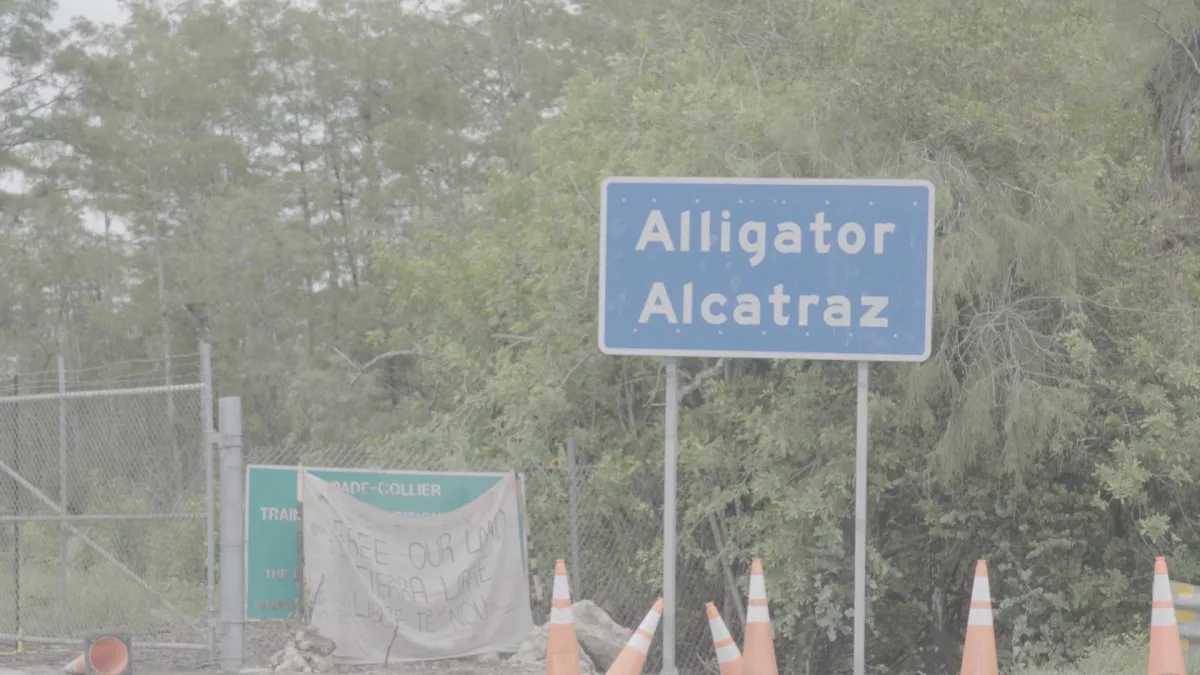
Controversy Swirls Around "Alligator Alcatraz" Facility in Florida Everglades
OCHOPPEE, FL – A remote stretch of U.S. Highway 41, deep within the sensitive ecosystem of the Florida Everglades, has become the focal point of a contentious debate. Protesters have gathered near the entrance of a newly constructed migrant staging facility, controversially nicknamed "Alligator Alcatraz," to voice their opposition on environmental, humanitarian, and land rights grounds.
The facility, located at the Dade-Collier Training and Transition Airport, has been rapidly erected under the direction of state officials. As seen in recent video footage, the entrance is marked by temporary fencing and the presence of Florida Highway Patrol, indicating a tense and monitored situation.
Protesters lining the highway hold signs with a variety of messages that paint a picture of their multifaceted opposition. One prominent banner reads, "FREE OUR LAND / TERRA LIBRE / LIBERE TE NOU," signaling a protest rooted in land rights and encompassing English, Spanish, and Haitian Creole-speaking communities. This message hangs near a sign for the Dade-Collier county line, highlighting the facility's location on the edge of the Big Cypress National Preserve.
Environmental concerns are a central theme of the protests. Signs such as "DEFEND BIG CYPRESS" and "PRESERVE NATURE NO MORE !! DESTRUCTION" point to fears that the facility threatens one of the most ecologically vital and unique watersheds in the United States. Environmental groups and activists, including the Miccosukee Tribe who consider this their ancestral homeland, have filed lawsuits, arguing that the construction proceeded without the required environmental impact studies and poses a risk to the fragile ecosystem and its wildlife, including the endangered Florida panther.
The most provocative signs directly challenge the facility's purpose and the conditions within. One large red sign declares, "CLOSE THIS CONCENTRATION CAMP NO US MARINES HERE," using highly charged language to condemn the site. Another protester holds a sign stating, "NO CONCENTRATION CAMPS," with the subtext, "NO CAGES IN THE WILD. NO CAGES FOR PEOPLE." These slogans connect the perceived caging of humans with the degradation of the natural environment. While some signs mention the "US Marines," official sources indicate the facility is being operated by the Florida State Guard and other state agencies, not the federal military.
Other signs call for broader policy changes, such as one urging to "UPDATE IMMIGRATION PATHS" for a "BETTER NATION." This suggests that for some, the protest is not just about the specific facility but is part of a larger call for comprehensive immigration reform.
State officials have defended the establishment of the facility, describing it as a necessary base camp for processing migrants, particularly those arriving by sea. They argue that its remote location, surrounded by inhospitable swampland known for alligators and pythons, makes it a secure and cost-effective site for staging individuals ahead of deportation. The project has been fast-tracked using state emergency powers related to immigration.
As vehicles pass by on the highway, the small but determined group of protesters continues their demonstration, ensuring that "Alligator Alcatraz" remains a symbol of the deeply polarized intersection of immigration policy, environmental protection, and human rights in the state of Florida.
